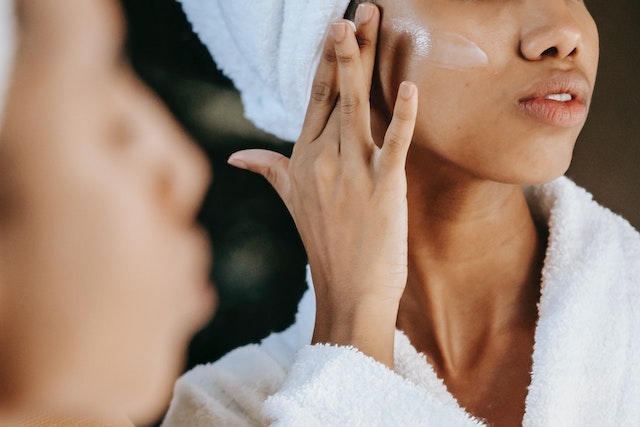Sensitive skin is more than just a cosmetic issue. People who suffer from skin sensitivity often struggle to find makeup and skincare products that can help them feel good about themselves and their skin without causing pain and irritation. Ironically, having sensitive skin can make it more difficult to protect it from outside sources that you’re probably more sensitive to already.
Battling sensitive skin seems like a never ending endeavor to many people. That’s why we got the inside scoop from some reliable sources to give you some ideas as you navigate your sensitive skincare journey. Check out their tips for essential skincare habits for sensitive skin!
Spot Test Everything
If you have sensitive skin, you’ve probably had your fair share of irritations caused by products that just didn’t work for you. Rather than spending days recovering from a breakout, rash, or peeling skin from products that caused irritation, you should test them prior to applying the products to a large area of your body.
“Test a product well prior to using it,” says Rachel Roff, Founder and CEO of Urban Skin Rx. “This goes for any product you apply to your skin – not just facial products. Check sunscreens, bug sprays, lotions, and soaps prior to using them on your entire face or body. Test in an inconspicuous area (like behind your ear) first. Wait 24 hours and then do a small test on your face or body where you plan to use the product and wait another 24 hours. This can feel like a tedious process, especially if you’re excited about a new product you just bought, but it can save you from a painful or irritating experience.”
Don’t Overdo It
While it may seem like washing and exfoliating frequently to remove makeup or other products could help your skin, you actually might be making things worse. Avoid exfoliating more than once or twice a week and stick to washing your face in the morning and evening with a gentle cleanser for the rest of the week.
“Exfoliating might sound like it’s a great way to make sure you remove all potential irritants, but it’s actually going to make your skin more sensitive to products that you use,” says Stephanie Venn-Watson, CEO of Seraphina Therapeutics. “Exfoliants are very abrasive and remove not only products, but the outer layer of dead skin along with the natural oils that your skin produces. If you’re removing those barriers too frequently through excessive washing and exfoliation, you’re going to essentially rub your skin raw, dry it out, and cause it to be extremely sensitive – even toward products that had previously not bothered you.”

Use Cleansers, Not Soaps
Did you know there is a difference between cleansers and soaps? For people with sensitive skin, this can make all the difference! Soaps are made of glycerine or similar products that can dry out and irritate sensitive skin.
“Look for gentle cleansers,” says Miles Beckett, CEO and Co-Founder of Flossy. “You don’t have to use soap to clean your skin. Cleansers without exfoliants, acids, soaps, or fragrances are the best options for people with sensitive skin. These cleansers aim to help remove dirt and makeup without stripping all of the natural oils and protective barriers from your skin.”
Natural & Safe
There’s a misconception that natural products are more gentle on skin. While you should look for skincare products made for sensitive skin with as few ingredients as possible, there are actually some “natural” or “organic” products that could irritate your skin just as much as harsh chemicals. Because these are naturally occurring oils and materials, there’s often a higher chance for allergic reactions to occur. Talking with your doctor or dermatologist about the skincare products you use is often a great starting point if you’re trying to create new skincare habits.
“It might surprise you, but essential oils can actually be really harmful for sensitive skin,” says Dr. Michael Green, Chief Medical Officer at Winona. “Citrus oils like orange, lemon, and grapefruit are often used in soaps and cleansers for their fresh scent, but they’re very reactive to sunlight and can cause burns and irritation hours after the product has been used. Additionally, common essential oils like tea tree, lavender, bergamot, and chamomile can cause intense allergic reactions in people with sensitive skin. It seems backwards, but sometimes the best products for people with sensitive skin contain no natural ingredients at all.”

Take Quick, Warm Showers
While a hot shower can feel amazing after a long day or a strenuous workout, it can also be very irritating to your skin. If you have sensitive skin, you should avoid taking hot showers or prolonged baths in water that is much warmer than your body temperature as these can cause your skin to dry out and become more sensitive to cleansers, makeup, and other products that you use.
“While it may not feel the best, a shower temp between 96-99 degrees Fahrenheit is recommended for people with sensitive skin,” says Fred Gerantabee, Chief Experience Officer at Readers.com. “Many of us are tempted to up that temp to the 105 range, but if you have sensitive skin, those few degrees can make a massive difference. You’ll also want to avoid soaking in the tub more than once or twice a week and never for more than 15-20 minutes to avoid damaging the outer skin cells which leads to dry and sensitive skin.”
Moisturize And Protect
Sensitive skin is more vulnerable to dryness, burning, cracking, and irritation. Because of this, it’s important to take all of the necessary precautions to protect it from any environmental factors. A great skincare habit for sensitive skin is moisturizing regularly and applying something with an SPF factor of at least 30.
“Using a quality moisturizer in the morning and evening is a great way to keep your sensitive skin healthy,” says Brooke Galko, Marketing Coordinator at PUR Cold Pressed Juice. “Find a good moisturizer that is made for sensitive skin and use it on a regular basis. For morning moisturizers, look for something with an SPF rating of 30 or more to protect your skin from the sun too.”
Conclusion
Developing skincare habits for sensitive skin is an essential step in maintaining healthy skin. As your body’s largest organ and first line of defense against outside factors, it’s important to make sure you’re keeping your skin happy and healthy.
If you’re prone to irritation because of your sensitive skin, there are some great habits to develop to prevent this from happening as much as possible. Spot test new products over a period of a few days and make sure the ingredients aren’t something that will irritate you. Keep in mind that natural products can cause irritation too. Look for cleansers instead of soaps and avoid exfoliants which can cause damage to the outer layer of skin. It’s also a great idea to protect your skin with moisturizers and SPF. Finally, as you shower or bathe, make sure your water temperature isn’t too high.
Hopefully, these ideas have given you a good idea of ways to develop skincare habits for sensitive skin.


































